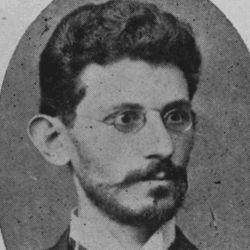
Gerson Rosenzweig (Yiddish: גרשׁון ראזענצװױג) (1861–1914), born in Białystok, was a Russian-American editor, author, and poet. He is best known for his Hebrew- and Yiddish-language satires, poems, and epigrams. He received his education in Berlin, Kraków, and other cities of the Russian Empire. He conducted a Hebrew school in Suwałki, Russian Poland, before emigrating to the United States in 1888. After settling in New York City, Rosenzweig became joint editor of the Yidishes tageblatt ('Jewish Daily News'), Yidishe gazetten ('Jewish Gazette'), and Idishe velt ('Jewish World'), a position he held until 1905. He edited and published a weekly, Ha-Ivri ('The Hebrew'), from 1891 to 1898, a monthly, Kadimah ('Forward'), from 1898 to 1902, and Ha-Devorah from 1911 to 1912. He also contributed to the leading Hebrew and Yiddish papers of his time. Rosenzweig's "masterpiece" was Massekhet Amerika, published by A. Ginsberg in New York in 1891 and by the Romm publishing house in Vilna in 1894. It was later included in his 1907 book Talmud Yankaʼi ('The Yankee Talmud'). The popular satire, written in the style of a Talmudic tractate, critiques the social conditions in New York's immigrant Jewish community. Portions of the work were printed in translation in The Sun and other New York papers. He published several works of poetry. These include Shirim u-meshalim (New York, 1893), a volume of poetry; Ḥamishah ve-elef mikhtamim mekoriyim (New York, 1903), a collection of 1,005 of his Hebrew epigrams and poems; and Mi-zimrat ha-aretz (1898), Hebrew translations of American national songs.
Filter resources by Category
Filter resources by Tag
Filter resources by Collaborator Name
Filter resources by Language
Filter resources by Date Range
Resources filtered by COLLABORATOR: “Aharon N. Varady (transcription)”
(clear filter)
Contributed by:
Aharon N. Varady (transcription), Gershon Rosenzweig (translation), Thomas A'Becket, Sr.
“Columbia, the Gem of the Ocean” (originally “Columbia, the Land of the Brave”) was an American patriotic song popular in the United States during the 19th and early 20th centuries. Adapted by Thomas A’Becket, Sr. around 1843 from the British patriotic song “Britannia, the Pride of the Ocean”, Columbia was long used as an unofficial national anthem of the United States, in competition with other songs. . . .
Contributed by:
Aharon N. Varady (transcription), Berl Lapin (translation), Gershon Rosenzweig (translation), Samuel Francis Smith
The well-known patriotic hymn with a Hebrew and a Yiddish translation. . . .
Contributed by:
Aharon N. Varady (transcription), Berl Lapin (translation), Gershon Rosenzweig (translation), Francis Scott Key
The National Anthem of the United States of America with a Yiddish translation by Berl Lapin. . . .

